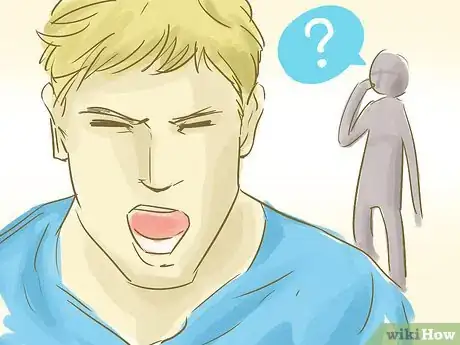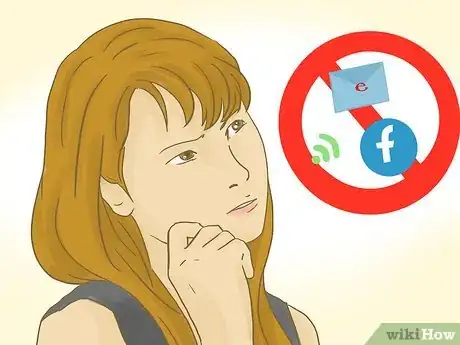wikiHow is a “wiki,” similar to Wikipedia, which means that many of our articles are co-written by multiple authors. To create this article, 11 people, some anonymous, worked to edit and improve it over time.
There are 10 references cited in this article, which can be found at the bottom of the page.
This article has been viewed 40,285 times.
Learn more...
We often don't have the luxury of avoiding someone we dislike, or even letting our irritation show. The ability to treat people politely and respectfully can be a great skill to have in these situations. You may find something to appreciate in the other person, or you might just learn to keep your relationship polite and shallow. Either way, practice will allow you to minimize the stress these interactions cause in your life.
Steps
Talking to Someone You Dislike
-
1Stick to light conversation topics. Don't bring up politics or religion, and avoid topics that have triggered an argument before. Instead, talk about the person's hobby, the weather, food, or a shared friend.
- Parents usually love to talk about their children.
-
2Let the other person do the talking. If you are forced to have a conversation with someone, make an effort to keep your contributions polite and short. Deliver a small compliment on the person's clothing or house when you join a conversation with him. Ask him short, basic questions about how his day has been going, or whether there's anything new with his family. Listen to the answers without interrupting, even if he talks for some time. The less you say, the less likely you are to reveal your dislike.[1]
- If you can't think of anything nice to say, just smile and nod instead.
Advertisement -
3Be conscious of your body language. Rubbing the back of your neck, crossing your arms, or shifting your weight back and forth can signal that you are bored or nervous.[2] If this is someone you don't want to offend, try to keep your feet still and your arms at your sides.
-
4Avoid sarcasm or dry humor. Subtle humor can be easily misinterpreted as offensive, especially if you accidentally let your real opinion show through in your tone of voice. Only make obvious, straightforward jokes, or none at all, and don't tease the person you dislike, even in a "friendly" fashion.[3]
-
5Extricate yourself from the conversation. A socially savvy person may end the conversation herself once she sees that you are only giving short responses. If she doesn't, however, politely excuse yourself by saying "It was nice talking to you! I've got to get back to (my errands/my work/my day.)"[4]
- Another option in a group conversation is to ask another person questions so the focus shift to him instead of the person you dislike.
- If you do not have the option of leaving permanently, give yourself a "time out" by excusing yourself to the bathroom for a few minutes.
Finding Someone's Better Side
-
1Don't turn one interaction into someone's personality. People often assume what they see is someone's personality, not a temporary reaction. If you see someone shouting, that is often the result of a bad day, not anger management issues.
- Psychologists call this the "fundamental attribution error" or "correspondence bias."
-
2Question whether someone's behavior is directed at you. People tend to think events are more about themselves than they actually are. If someone is acting stiff or rude, it's often because he's thinking of something else, not trying to offend you. If someone doesn't mention your new haircut, it's usually because he hasn't noticed, not because he wants to make you unhappy.
-
3Look for positive attributes. Find something good you can say about the other person, and repeat it to yourself or out loud when you start complaining. If you don't know about any positive actions this person has done, compliment her on her clothing or her car. If she talks frequently about a topic, even if it's not one you are interested in, tell her you're impressed by her depth of knowledge on that topic.[5]
-
4Ask questions. Get to know the other person by asking questions. Stay away from personal topics if you don't know him well, but follow up threads in the conversation by asking more about a person, place, or event that he mentions.
-
5Meet in other contexts. Some people behave very differently in large groups or energetic environments than they do in one-on-one conversations or in quiet situations. If you would like to give someone another chance, try meeting them in a different context than you normally would. Invite them to a gathering with a different group of friends, or talk to a coworker over lunch in a cafe.[6]
- If there's no hope for a friendship at this point, or at least a cordial acquaintanceship, move on to the next section.
Minimizing Repeated Contact
-
1Focus on small goals. There are plenty of people that you have to see every week, or at least every holiday, but don't get along with. Remember that your goal is not to befriend these people or get to know them better. Aim for basic, easy goals like these:
- Say hello, say goodbye, and not get anyone upset or offended in between.
- Don't respond to any of your coworker's offensive statements this week.
- Finish the collaborative project without revealing your irritation.
-
2Plan an escape route from events. If you know that someone you dislike will be at a particular event, plan an excuse in advance so you can cut the visit short. Ideally, create a real reason so you can't be caught in a lie. For example, only hire a babysitter for half of the evening, or make plans with a family member so you are "forced" to leave early for family reasons.[7]
-
3Create an anti-awkwardness plan. If someone tends to cause uncomfortable silences, or talk about offensive topics, have a conversation topic ready in advance. When she joins a conversation, comment on a current event that you read in the news, or mention a popular movie or music you saw recently.[8]
- Avoid political news and other controversial topics.
-
4Focus on the countdown. Remind yourself that you only have to be stuck with this person for a limited amount of time. Count how many minutes you have left, and concentrate on that number if you find yourself getting annoyed or angry.
-
5Deflect requests for online contact. If asked for your email address or social media information, claim that you don't check it often (if this is believable). If they do contact you through one of these avenues, don't respond, or respond only after a few days with a short message apologizing for being too busy to reply at the time.
-
6Politely ask someone to cease unacceptable behavior. If someone is intruding in your personal space with unwelcome physical contact, or trying to contact you constantly, politely address the issue. "I'd appreciate it if you'd stop." is all you need to say to communicate your boundaries politely.[9]
- Use "I" statements, such as "I'm not a fan of hugging," and avoid using the word "you," which can sound accusatory.
-
7Break ties only if necessary. If someone's presence in your life is causing serious stress, and the other person isn't picking up on your more subtle cues, try to end the "friendship." It's best to do so as politely as possible, and is not recommended for people you work under or are in contact with every day. If you have no other options, tell the other person, "I'd prefer we didn't spend as much time together."[10]
References
- ↑ https://www.vice.com/en_us/article/gqymzx/how-to-talk-to-someone-you-hate
- ↑ https://www.insider.com/body-language-signs-that-someone-doesnt-like-you-2018-6
- ↑ https://www.psychologytoday.com/us/blog/think-well/201206/think-sarcasm-is-funny-think-again
- ↑ https://www.forbes.com/sites/civicnation/2019/05/16/how-this-michigan-high-school-celebrates-its-seniors-on-decision-day/#3871d7b45a64
- ↑ https://www.psychologytoday.com/us/blog/fulfillment-any-age/201605/how-you-can-get-along-people-you-really-don-t
- ↑ https://www.lifehack.org/294859/how-smart-people-deal-with-people-they-dont-like
- ↑ https://www.psychologytoday.com/us/blog/friendship-20/201712/8-ways-deal-someone-you-cant-stand-dealing
- ↑ https://lifehacker.com/how-to-tell-someone-you-dont-like-them-without-being-a-5849558
- ↑ https://www.themuse.com/advice/4-better-ways-to-handle-a-condescending-coworker-than-stooping-to-his-level











































































